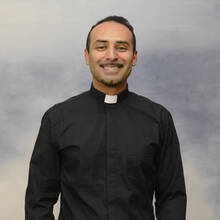The boundaries of the spirit and the limits of our imagination
The Book of Numbers captures a chaotic time of organization and transition for the wandering people of God in the wilderness. Today’s first reading highlights two theological difficulties that often arise in uncertain times: questions around the sharing of God’s spirit among the people, and concerns about matching the right person with the right ministerial office. They appear in today’s Gospel passage as well. These questions around ministry and shared power within a community of faith, while ancient, are surprisingly contemporary in nature.
Would that all the people of the Lord were prophets! (Nm 11:29)
Are you aware of the limits of your thinking the way the disciples do in today’s reading?
Where is the spirit of God working today that might seem strange for some?
How did the visit of Pope Francis to Southeast Asia challenge or inspire you?
Ancient texts can often appear strange to the modern person, yet this is a common phenomenon in Scripture. The strangeness helps to develop our imagination for the divine. In Numbers, for example, a strong focus is placed on the transfer of power centered around Moses. How might the office of Moses, as divine spokesperson, become more efficient in order to meet the demands of all the tribes of Israel? “Taking some of the spirit [of God] that was on Moses,” says the narrator, “the Lord bestowed it on the seventy elders” (Nm 11:25). This emphasis on “some of the spirit” is meant to display a sharing of office. It is a matter of some seriousness even for the modern-day church, which places emphasis on the laying-on of hands for priestly ordination along with the desire for unity among the College of Bishops. The workload is both divine and meant to be shared.
Moses has no qualms about sharing his ministerial office: “If only all the people of the Lord were prophets! If only the Lord would bestow his spirt on them!” (Nm 11:29).
In Scripture, when things tend to fall into disarray, the people of God want answers. Who is to blame? One limited response by a certain theologically fixed mindset is to identify the fault with those who do not follow liturgical guidelines or God’s law in general. This is expressed in today’s psalm: “Though your servant is careful of them [precepts], very diligent in keeping them, yet who can detect failings?” (Ps 19:12-13). In the early Christian community, a person not officially sanctioned could be seen as unfit for any kind of ministry, role or office among the followers of Jesus. The temptation might be to label such an incident as a breach of God’s precepts. The unsanctioned individual could then be blamed for any sort of mishap that occurred around him or her within the community.
While the above difficulty is a real concern, there are several passages that push back against this narrow concern for how the good news is actually communicated on the ground and in reality. Today’s Gospel provides a good example of how an unsanctioned exorcist may still be effective in God’s kingdom. The disciples of Jesus have a hard time letting that theological insight sink in. “Teacher, we saw someone driving out demons in your name, and we tried to prevent him because he does not follow us” (Mk 9:38). Jesus responds just as Moses did in the first reading: “Do not prevent him” (Mk 9:39). In other words, let the good happen. Allow the person in good faith to minister in Jesus’ name. In line with Moses’ thinking, if only all people would heal those in need through the acknowledged presence of Christ in their midst.
Sunday’s readings reinforce the need for a sharing of the spirit. The boundaries of the spirit are limited only by our theological imagination. If good is being done in faith, then this becomes the critical measure to celebrate God’s power at work within the community of believers. “For whoever is not against us,” says Jesus in his teaching mode, “is for us” (Mk 9:40).








